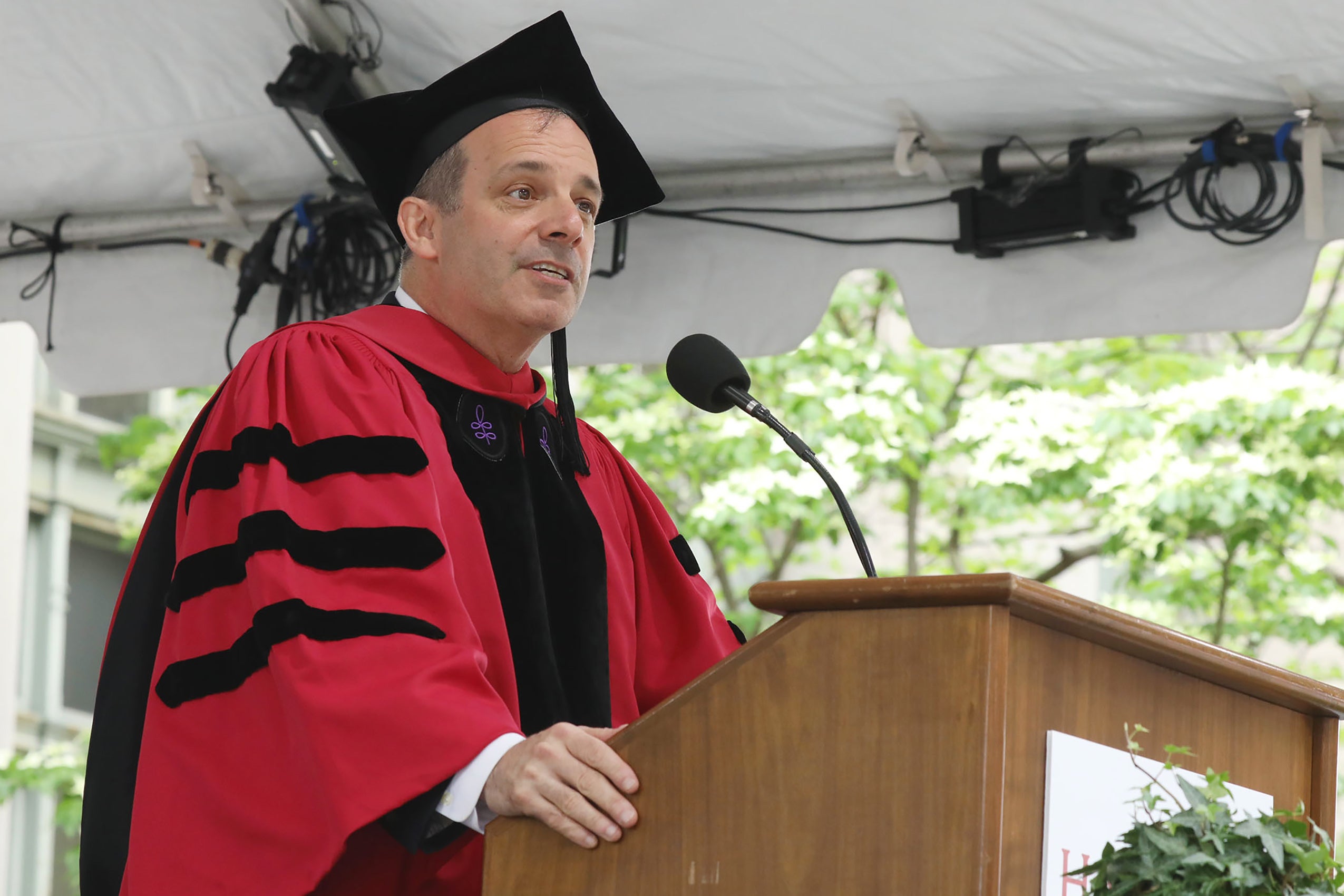Do something you care about, use your legal superpowers, and be a person of integrity.
In his second commencement address, Harvard Law School Dean John F. Manning ’85 shared his “three simple rules for a long and happy life as a lawyer” with the 801 graduates of the Class of 2019.
Noting in a light moment that many fellow alumni he’d recently queried could hardly recall what their deans had told them at commencement, Manning promised the audience of thousands gathered on Holmes Field—which included newly-minted Harvard lawyers as well as families, friends, faculty, and staff—that his remarks would be “brief and direct.”
The dean’s first rule: Do something you care about. “I want you not to forget the person you described to us in your applications,” Manning urged, “the one who was eager to lead, who wants to change things, to make the world better.”
“There’s absolutely no doubt that you’ll be great lawyers,” he said. “You’ll be successful at whatever you do. But…that makes it really easy to go on autopilot. So I’m here today to tell you: Don’t do it.”
Manning said Supreme Court Justice Elena Kagan was right when she told graduates in her final commencement address as dean in 2009 that “people get what’s most important and fulfilling to them by pursuing what’s most important and fulfilling to them, rather than being borne along by the currents.” And if you ever find that you are not excited to wake up and go to work, he added, “I hope you will find the courage and fortitude to keep searching.”
Manning’s second rule: Never forget that being a great lawyer is your superpower. As Harvard lawyers with years of rigorous training, the dean noted HLS graduates leave campus with “exceptional powers of analysis, expression, and persuasion.”
“You are able to break the most complex problems into their component parts, to see their structure, and to put them back together…That’s how we’re trained, here at Harvard, from generation to generation.”
In an era, Manning said, “when we risk valuing ideology over evidence, rhetoric over reason, party over principle, the ability to make rigorous legal arguments; to marshal evidence; to find facts, real facts—that is a true superpower.”
To emphasize his point, Manning shared a quote from his classmate, the great civil rights lawyer and Equal Justice Initiative founder, Bryan Stevenson ‘85, who once observed that in preparing to pursue a career defending the rights of others, “‘I needed to know everything about substantive due process and procedural due process and federalism and comity and all of the doctrine[s] that…impact my ability to help condemned people get the justice that they deserved.’”
Stevenson’s words are “true and important,” said Manning, who encouraged the graduates to “strive to perfect your craft…Be a great lawyer, and there’s no limit to what you can do.”
The dean’s final rule: Be a person of integrity. “As lawyers, it is of course our job to think creatively about how to help our clients achieve their objectives” Manning said. “But it is also our job to say no when the law requires it.”
Doing so, he acknowledged, can sometimes be costly personally or professionally. “You may even,” he said, “stop in its tracks some policy initiative that you think is terrific and very, very important, but just not authorized by law.”
Manning, however, emphasized, “We are guardians of the rule of law. That is our distinctive function. And it’s never been more important. In a contentious time, we are uniquely responsible for the integrity of law, of process, of factfinding, of truthfinding—the antidotes to chaos and to the capacity of power, whatever its source, to push aside reason and fairness and principle. That is a high calling.”
Although adhering to principle can be painful, Manning recalled the words of a wise mentor who told him, “‘Our commitment to principle is tested only when it hurts’.”
In conclusion, Manning wished for Harvard’s newest class of lawyers “the satisfaction of serving that high calling and of pursuing the highest ideals of law and justice.”
“It’s been our distinct honor at Harvard Law School to help launch you on what I know will be impactful lives and careers,” he said.
